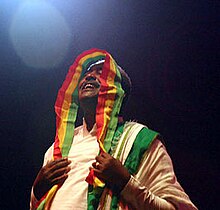Mahmoud Ahmed
| Mahmoud Ahmed ማሐሙድ አህመድ |
|
|---|---|

Mahmoud Ahmed performing in 2005.
|
|
| Background information | |
| Born |
May 18, 1941 Addis Ababa, Ethiopia |
| Instruments | Vocals |
| Associated acts | Imperial Body Guard Band, Ibex Band, Venus Band, Walias Band, Idan Raichel Project, Roha Band |
| Notable instruments | |
| krar | |
Mahmoud Ahmed (born May 18, 1941) (Amharic: መሀሙድ አህመድ) is an Ethiopian singer of Gurage ancestry. He gained great popularity in Ethiopia in the 1970s and among the Ethiopian diaspora in the 1980s before rising to international fame with African music fans in Europe and the Americas.
Born in Addis Ababa's Mercato district, Mahmoud was enthralled with the music he heard on Ethiopian radio from an early age. Having done poorly at school, he shined shoes before becoming a handyman at the Arizona Club, which was the after hours hangout of Emperor Haile Selassie I's Imperial Body Guard Band. One night in 1962 when the band's singer didn't show up, Mahmoud asked to sing a few songs. He soon became part of the band's regular lineup, where he remained until 1974.
After cutting his first single with Venus Band "Nafqot New Yegodagn"/"Yasdestal" in 1971, Mahmoud continued to record with several bands for the Amha and Kaifa record labels throughout the 1970s. The overthrow of Emperor Sellassie and the suspension of musical nightlife under the military government created shifts in the Ethiopian music industry—the Imperial Body Guard Band were no more, and Mahmoud continued to make hit records and cassettes with many musicians who remained in the country, including the Dahlack Band, and the Ibex Band. He also began to release solo cassettes, accompanying himself on the krar, guitar or mandolin.
By 1978, censorship laws prevented Mahmoud from releasing his music on vinyl and so he switched to releasing cassettes. In the 1980s, Mahmoud operated his own music store in Addis Ababa's Piazza district while continuing his singing career. With many Ethiopian refugees living abroad, Mahmoud became one of the first modern Ethiopian music makers to perform in the United States on a 1980-1981 tour with the Wallias Band, Gétatchew Kassa, and Webeshed Fisseha. Mahmoud soon began releasing records with the Roha Band and became popular in diaspora communities.
...
Wikipedia
